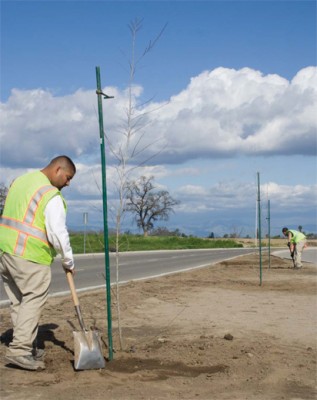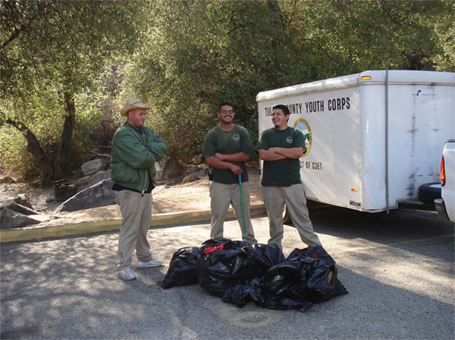Visalia’s Self-Help Training and Employment Center was almost ten years old when it took on its role as Tulare County’s community action agency in the 1980s. Shortly thereafter, the Tulare County Conservation Corps was started as a program of the organization to serve young people who wanted to continue their education and acquire important job skills. Forty years later, the retitled Community Services and Employment Training (CSET), and its renamed Sequoia Community Corps (SCC) is ramping up their mission of strengthening youth, families, and the surrounding region through a host of social services that include urban forestry.
The SCC is composed of disadvantaged youth, ages 18-24. Most of these young people cannot compete in the job market. Some have not finished high school. Others have criminal records. CSET and the SCC provide these young adults with job training and placement, as well as assistance to corps members for earning their high school diplomas. They have provided over 4,000 young adults with job training and educational opportunities over the past 20 years.
Some of the SCC’s original projects included trail maintenance and development in Sequoia and Kings Canyon National Parks. Their work in some of the nation’s most impressive forests naturally progressed into opportunities to bring the forest to the urban areas CSET served. SCC’s first urban forestry projects were in partnership with the Urban Tree Foundation.
The two organizations still work hand-inhand to plant trees today. The majority of these projects focus on unused riparian strips where native oaks and understory plants are placed along new hiking trails cut by SCC members. These trails provide a green escape in an area that would otherwise remain unused, and offer residents and visitors alike a glimpse into what the benefits of a strong environmental education program can mean for the region’s and its at-risk youth.
While many community members enjoy the beauty of these areas, many don’t realize the additional benefits CSET provides the community through its urban forestry program. The green trails capture storm water, increase wildlife habitat, and improve air quality in a region consistently ranked as one of the worst in the nation for smog and ozone pollution.
CSET continues its efforts to increase visibility on the tangible benefits of its project through a variety of tools and resources. One such resource is the federal grant secured by CEST in 2010 through the American Recovery and Reinvestment Act. These funds which are administered by California ReLeaf are supporting a multi-faceted project in which members of the SCC will be working to restore a native Valley Oak riparian forest along a creek that is currently devoid of vegetation while also improving Visalia’s urban forestry streetscape. The project brings the added benefit of significant job creation to a county with a 12% unemployment rate as of October, 2011.
Much of the success of this project and CSET’s urban forestry program can be attributed Nathan Higgins, CSET’s Urban Forestry Program Coordinator. In comparison to the longevity of the SCC, Nathan is relatively new to the job and to urban forestry. Before coming to CSET, Nathan was employed in wildland conservation at the nearby national parks and national forests. It wasn’t until he worked in an urban environment that he realized how important community forests were.
“I had a revelation that, even though the people in these communities only live 45 minutes from some of the best national parks in the country, many of them can’t afford to make the short trip to see the parks. The urban forest brings nature to people where they are,” says Higgins.
He hasn’t only witnessed how urban forestry can change communities, but also how it can change individuals. When asked for examples of what SCC does for Corps members, Nathan is quick to respond with stories of three young men whose lives he’s seen transformed.
The three stories all start the same way – a young man who joined the SCC with little opportunity to better his life. One started as a crew member and has been promoted to crew supervisor, leading other young men and women to better their lives just as he has. Another is now working with the City of Visalia Park and Recreation Department as an intern doing park maintenance. His internship will hopefully turn into a paid position as funding becomes available.

Urban Forestry corpsmembers ‘greening’ our urban spaces.These young Valley Oaks will live for hundreds of years and provide shade and beauty for generations.
The most compelling of the three stories though is that of Jacob Ramos. At 16-years old, he was found guilty of a felony charge. Afterhis conviction and time served, he found it nearly impossible to find a job. At CSET, he earned his high school diploma and proved himself as one of the most dedicated workers in the SCC. This year, CSET opened a for-profit subsidiary that does weatherization work. Because of his extensive training completed with the Corps, Jacob now has a job there.
Each year, CSET plants over 1,000 trees, creates accessible hiking trails, and employs 100-150
young people. More than that, it has gone above and beyond its mission to strengthen youth, families, and communities in Tulare County. CSET and the SCC are a reminder of what can be accomplished for our environment and future generations through partnership and perseverance.

